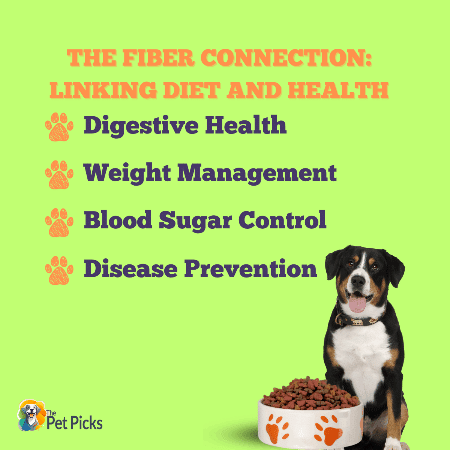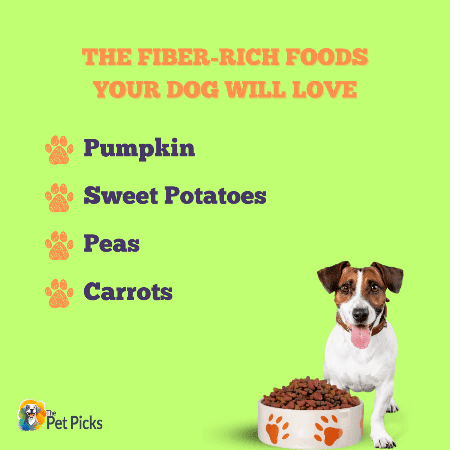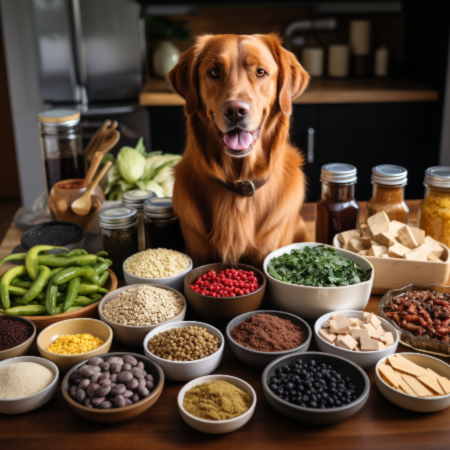Why Fiber Matters in Your Dog's Diet
As dog parents, we all want the best for our furry friends. We strive to provide them with the best care, the best environment, and of course, the best diet. But when it comes to their diet, one crucial component often gets overlooked – fiber.
Fiber plays a vital role in your dog's diet, contributing to their overall health and well-being. It aids in digestion, helps maintain a healthy weight, and can even contribute to disease prevention. But what exactly is fiber, and why is it so important for your dog's health? Let's delve into the world of canine nutrition to find out.
The ABCs of Fiber: What It Is and Why It's Important
Fiber is a type of carbohydrate that cannot be broken down by the enzymes in your dog's digestive system. While it may seem like something that just passes through the system without providing any benefits, that's far from the truth.
Fiber plays several key roles in your dog's health. It adds bulk to their diet, helping them feel full without adding extra calories. This can be particularly beneficial for dogs who are on a weight management plan.
Moreover, fiber aids in digestion. It helps regulate the movement of food through the digestive tract, ensuring that nutrients are properly absorbed along the way. It also promotes healthy bowel movements, reducing the risk of constipation and diarrhea.
But the benefits of fiber don't stop there. It also plays a role in regulating your dog's blood sugar levels, reducing the risk of diabetes. Some types of fiber can even promote the growth of beneficial gut bacteria, contributing to a healthy gut microbiome.
Understand safe and unsafe foods for dogs with our Comprehensive Guide to Safe and Unsafe Foods for Dogs.
The Fiber Connection: Linking Diet and Health
When it comes to the health of our dogs, diet plays a crucial role. And within that diet, fiber holds a significant place. Let's take a closer look at how fiber contributes to various aspects of your dog's health.
Digestive Health
Fiber is a champion for your dog's digestive health. It aids in the movement of food through the digestive tract, helping to prevent issues like constipation and diarrhea. Furthermore, certain types of fiber, known as prebiotics, can promote the growth of beneficial gut bacteria. These bacteria play a crucial role in digestion, nutrient absorption, and overall gut health.
Weight Management
If your dog is carrying a few extra pounds, fiber can be a valuable ally in your weight management efforts. High-fiber foods add bulk to your dog's diet without adding extra calories, helping them feel full and satisfied without overeating. This can help your dog lose weight or maintain a healthy weight, reducing the risk of obesity-related health issues.
Blood Sugar Control
Fiber can also help regulate your dog's blood sugar levels. It slows the absorption of glucose into the bloodstream, preventing spikes in blood sugar after meals. This can be particularly beneficial for dogs with diabetes or those at risk of developing the condition.
Disease Prevention
By contributing to a healthy weight, a healthy gut, and stable blood sugar levels, fiber can help reduce your dog's risk of various health issues. These include obesity, diabetes, heart disease, and certain types of cancer.
Learn about the role of diet in preventing and managing canine obesity in our article Canine Obesity: The Power of Diet for Prevention and Management.

Fiber and Your Dog's Diet: Making the Right Choices
Now that we understand the importance of fiber, the question becomes: how can we ensure our dogs are getting enough of it? The answer lies in their diet.
Many commercial dog foods contain a certain amount of fiber, but the quality and quantity can vary widely. It's important to read the label and understand what you're feeding your dog. Look for foods that list whole grains, vegetables, and fruits among the first few ingredients, as these are good sources of fiber.
In addition to commercial dog food, you can also add fresh, fiber-rich foods to your dog's diet. Some good options include pumpkin, sweet potatoes, peas, and carrots. However, it's important to introduce new foods gradually and in moderation to avoid upsetting your dog's stomach.
The Role of DNA Testing in Your Dog's Diet
Understanding your dog's nutritional needs can be a complex task. Every dog is unique, and what works for one might not work for another. This is where DNA testing can be a valuable tool.
Companies like Embark Vet, Wisdom Panel, Orivet, 5Strands, and DNA My Dog offer DNA tests that can provide insights into your dog's breed, health, and more. These tests can help you understand your dog's unique genetic makeup, including potential health risks and dietary needs.
For example, some breeds may be prone to certain health issues that can be managed with diet, including the amount of fiber they consume. A DNA test can help you identify these risks and make informed decisions about your dog's diet.
Understanding Different Types of Fiber: Soluble and Insoluble
Fiber isn't just a single entity. It's actually made up of two different types: soluble and insoluble fiber. Both types play a crucial role in your dog's health, but they function in slightly different ways.
Soluble Fiber
Soluble fiber dissolves in water to form a gel-like substance. This type of fiber slows digestion, helping to regulate blood sugar levels and lower cholesterol. It's found in foods like oats, peas, beans, apples, citrus fruits, carrots, barley, and psyllium.
Insoluble Fiber
Insoluble fiber, on the other hand, does not dissolve in water. It adds bulk to the diet and helps to move food through the digestive system, promoting regular bowel movements and preventing constipation. Insoluble fiber is found in foods like whole wheat flour, wheat bran, nuts, beans, and vegetables such as cauliflower, green beans, and potatoes.
Get a comprehensive understanding of different types of dog food in our Ultimate Guide to Dog Food: Dry, Wet, and Raw Explained.

The Fiber-Rich Foods Your Dog Will Love
While commercial dog food often contains a certain amount of fiber, incorporating fresh, fiber-rich foods into your dog's diet can provide additional health benefits. Here are some dog-friendly, fiber-rich foods that you can consider:
Pumpkin
Pumpkin is a fantastic source of fiber for dogs. It's also rich in vitamins and minerals, making it a nutritious addition to your dog's diet. Plus, most dogs love the taste of pumpkin!
Sweet Potatoes
Sweet potatoes are another excellent source of dietary fiber. They're also packed with vitamins and minerals, including vitamin A, vitamin C, and potassium.
Peas
Peas are a great source of both soluble and insoluble fiber. They're also rich in vitamins and minerals, making them a healthy addition to your dog's diet.
Carrots
Carrots are not only a good source of fiber, but they're also low in calories and high in vitamins, making them a great choice for dogs on a weight management plan.
Remember, when introducing new foods into your dog's diet, it's important to do so gradually to avoid digestive upset. And always consult with your vet before making significant changes to your dog's diet.

The Power of Fiber in Your Dog's Diet
Fiber is a powerful component of your dog's diet, contributing to their overall health in numerous ways. From aiding digestion to helping manage weight, regulating blood sugar, and even preventing disease, the benefits of fiber are clear.
But remember, every dog is unique, and their dietary needs can vary. Always consult with your vet before making significant changes to your dog's diet. And consider using tools like DNA testing to gain deeper insights into your dog's unique needs.
At ThePetPicks.com, we understand the importance of providing your dog with a balanced, nutritious diet. We're here to help you make informed decisions about your dog's health, because they're not just pets – they're family.
FAQs
Why is fiber important in a dog's diet?
Fiber plays several key roles in a dog's health. It aids in digestion, helps maintain a healthy weight, regulates blood sugar levels, and can even contribute to disease prevention.
What are some good sources of fiber for dogs?
Many commercial dog foods contain fiber, but you can also add fresh, fiber-rich foods to your dog's diet. Some good options include pumpkin, sweet potatoes, peas, and carrots.
How much fiber does my dog need?
The amount of fiber your dog needs can depend on their age, size, and health status. It's best to consult with your vet to determine the right amount of fiber for your dog.
Can too much fiber be harmful to my dog?
While fiber is beneficial, too much of it can cause issues like bloating, gas, and diarrhea. It's important to balance your dog's fiber intake with their other nutritional needs.
How can DNA testing help with my dog's diet?
DNA testing can provide insights into your dog's breed, health risks, and dietary needs. This information can help you make informed decisions about your dog's diet, including their fiber intake.
What are some high-fiber foods I can add to my dog's diet?
Some high-fiber foods that are safe for dogs include pumpkin, sweet potatoes, peas, and carrots. Always introduce new foods gradually and in moderation to avoid upsetting your dog's stomach.
Can I give my dog a fiber supplement?
If your dog's diet is lacking in fiber, a fiber supplement may be an option. However, it's always best to consult with your vet before starting any new supplement regimen.
How can I tell if my dog is getting enough fiber?
Signs that your dog may not be getting enough fiber include frequent constipation or diarrhea, weight gain, and blood sugar fluctuations. If you're concerned about your dog's fiber intake, it's best to consult with your vet.
Can too much fiber be harmful to my dog?
While fiber is beneficial, too much of it can cause issues like bloating, gas, and diarrhea. It's important to balance your dog's fiber intake with their other nutritional needs.
How can DNA testing help with my dog's diet?
DNA testing can provide insights into your dog's breed, health risks, and dietary needs. This information can help you make informed decisions about your dog's diet, including their fiber intake.
This blog post is not medical advice and readers should consult with a veterinarian for any medical concerns and other professionals like professional trainers. The content provided is based on general information and our love for dogs and pets.

